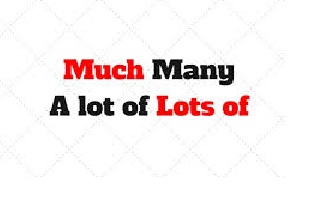In conversations with my English language students I often hear them using the adjectives ‘much’ and ‘many’ in positive sentences. For example, ‘’I have many friends in this town’’, and ‘’I have much time with my family’’. Grammatically, there is nothing wrong with using these terms in this way. However, students of English need to be aware that when used in isolation in a positive sense, ‘much’ and ‘many’ do not sound natural, and it can identify the speaker as a non-native. In positive sentences, native English speakers are more likely to say ‘a lot of’ or ‘lots of’.
Many / Much / A Lot Of
What’s the difference between ‘many’, ‘much’, and ‘a lot of / lots of’?
These are what we call quantifiers which mean ‘a large amount of’. The main difference between them is that we can use ‘much’ with uncountable nouns, ‘many’ with plural countable nouns, and ‘a lot / lots of’ with both countable and uncountable nouns. However, these words are often mixed up by English learners.
Much and Many
We usually use ‘much’ and ‘many’ in negative sentences and questions.
Much – we use much with uncountable nouns.
• How much time do you have?
• Peter can’t cook much food.
Many – we use many with countable plural nouns.
• How many cars do you have?
• Peter doesn’t speak many languages.
In Positive Sentences
We can use much and many in positive sentences after words like ‘so’, ‘too’, and ‘as’. (‘A lot of / lots of’ are not possible after ‘so’, ‘too’, and ‘as’).
• She often has too many drinks.
• Bring as much food as you need.
• They had so much fun in France.
but;
• They had so a lot of / lots of fun in Spain
There are times when ‘much’ and ‘many’ can be used alone in positive sentences, but only when speaking formally. However, this is not common in everyday English, and can sound strange in informal conversation.
• Much has been discussed about …
• Many teachers believe …
A lot of / lots of
A lot and lots of are more flexible quantifiers in English, which is why I encourage my students to use these expressions in preference to ‘much’ and ‘many’: they can be used in positive sentences with both countable and uncountable nouns. They can be used interchangeably;
• They have seen lots of films.
• They have a lot of dogs.
• I have a lot of water.
• You have a lot of money.
Although it is possible to use a lot/lots of in negative sentences and questions, it is more common to use much and many.
Example:
• Do you know many / a lot of / lots of people in your village?
So, as a learner of English, the next time you are tempted to use ‘much’ or ‘many’ in a positive sentence, think about using ‘a lot of / lots of’ instead. It will make you sound a little more natural, and will impress a lot of your friends!


Recent Comments